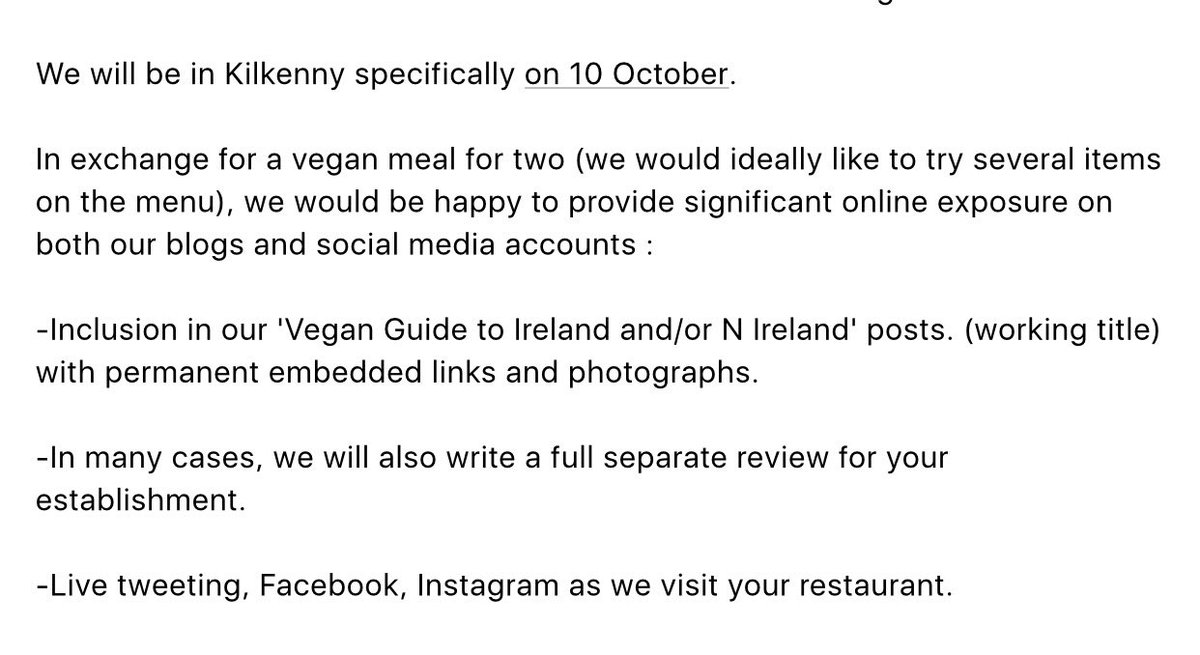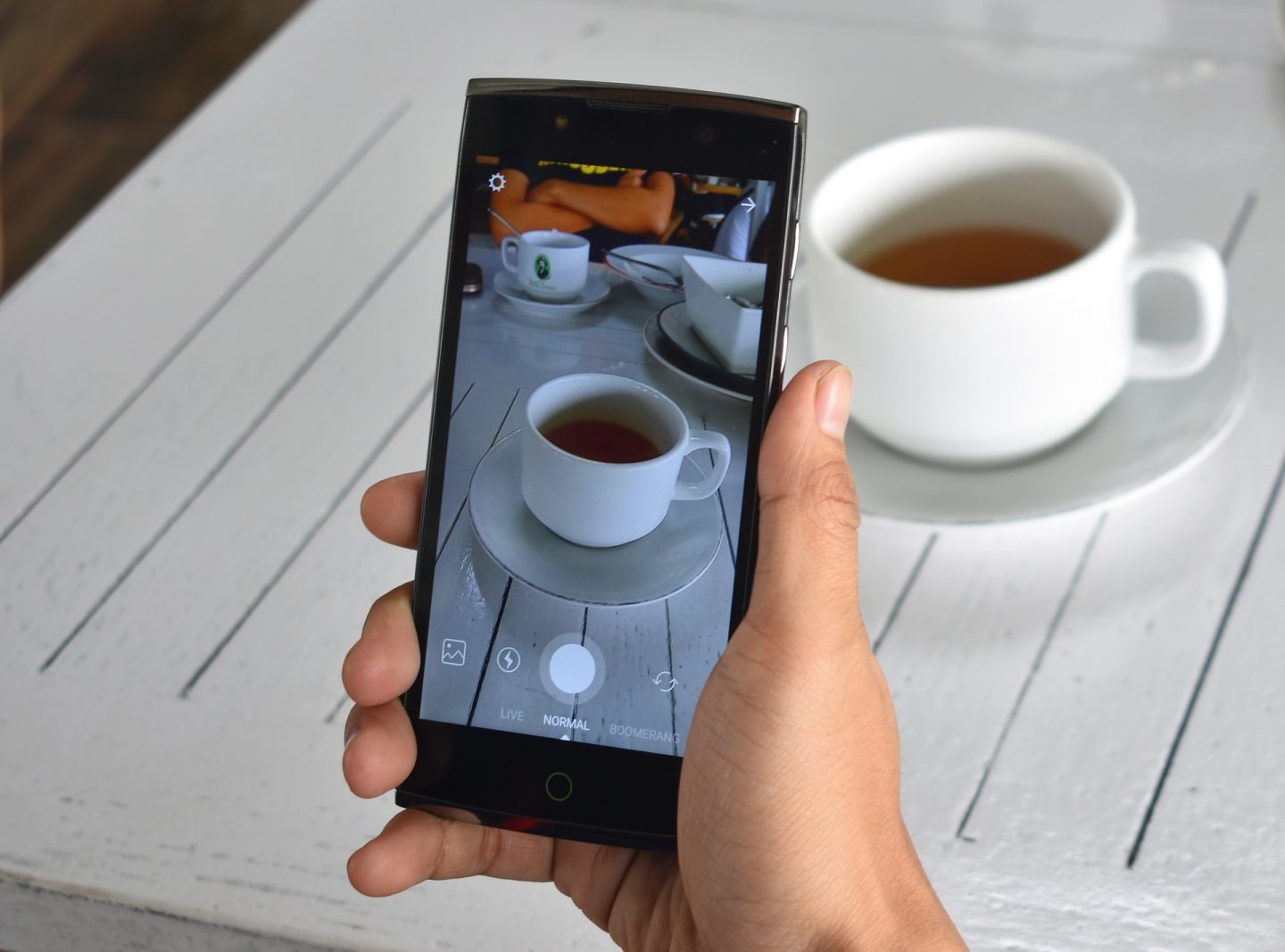What is that in the echo chamber that is Twitter? Another blogger controversy, you say? What happened this time, did an influencer fail to declare something as #ad? Did an Instagrammer damage some historical artefact trying to get the perfect shot? No. What happened was a food blogger wanted to eat for free. We know, you must be shook right now. But, cutting the jokes – this is, of course, happening all the time.

You see as bloggers, we all eat for free all the time. If you see a blogger in a restaurant, they’re eating for free. If you see us stand over the table, taking a picture of a meal, we’re clearly eating for free. If you see us in the queue of a cafe, waiting to order like everyone else, don’t forget for one second that we’re not paying for whatever we order. Walking around a supermarket? You betcha, picking out one by one the things to put in our basket and take home for free. Right? Forgive the sarcasm, but all of what we said just there is total tripe – hopefully you’ve detected. Sadly, though, ask a stranger on the street what a food blogger is, and they’ll probably give you a version of the above.
You hopefully know us by now, as we approach the (eek!) five-year-blogging milestone, and you will know resolutely that this isn’t how we work. Long term followers know that, our friends are privy to it and our bank manager most definitely knows it. The secret to our success is: we pay our way. And we are SO worse off for it, but in another sense we’re better off for it in every single way. It depresses us and fills us with joy at the same time. When it comes to food, we pay our way and develop our content anyway, so whenever another blagger blogger comes out of the woodwork demanding the moon and stars for free and they’re caught out on social media we cringe so hard we go into spasm.
The controversy this week for those of you not aware comes from Michelin-starred restaurant Campagne in Kilkenny. A blogger or influencer, the identity of whom is still somewhat hazy, emailed the restaurant directly asking essentially for a lavish free meal (with dietary stipulations) in exchange for “significant online exposure”, including live tweeting the meal, Facebook and Instagram posts plus potential inclusion in a vegan guide to Ireland and generously a possible maybe chance to just about get a standalone feature on their platform. Thankfully, Garret Byrne – Campagne’s head chef-proprietor – took it upon himself to call out this behaviour as unacceptable across social media.

Our reaction was a “Oh, here we go” (note: supplementary heavy sighing, severe eye rolling, and softly massaging temples) because we’ve heard these stories before. In fact, we’re sick to the back teeth of hearing this and beyond bored that this approach is still so commonplace. Why are some people seemingly incapable of creating content when they haven’t been given the tools for free? Baffling, because the pair of us are often left penniless doing it ourselves for GastroGays.

These people with a platform, let’s blanket brandish them ‘blaggers’ as so many others have, are directly sizing up to restaurants seeking free food because they believe their platform warrants it – or maybe it’s because they need that opportunity to continue to fuel that platform. No matter how many thousands of followers you claim to have on your Instagram, or how “influential” you appear on the surface (and there’s so often pitfalls elsewhere), no one should be allowed to expect a free meal from a restaurant. No matter what they serve, that restaurant has overheads. Let’s list them together: ingredients, staffing, electricity, gas, rent, refuse, business rates. When an eatery is just about able to cover these and make a profit, often a monumental new operational cost strolls through their front door, calling itself “marketing”.
Nowadays, restaurants have to partake in marketing to get themselves out there, a step up from the traditional word-of-mouth, a quick leaflet drop, a posting in the local newspapers. Actively sharing content on social media is now still not enough, for the big guns many enlist the skills of a PR agency and pay thousands delegating them the task of promoting and marketing their business to the public as best as possible. Makes sense, right? As then the restaurant can focus their time and attention on their actual skills: staying afloat, feeding the masses and actually enjoying the job of restaurant ownership.
But, PR agencies often fuel this ‘blagger’ practice. Hear us out. PR agencies have decided in this day and age that the best form of marketing is to get people with followings online to try out the offering in return for promoting the place. We’re not amongst the biggest bloggers in the world, maybe not even in Ireland, but every single day we get emails from PR agencies working on behalf of restaurants and eateries in London and Dublin publicising a fresh menu, new opening or campaign. 95% of the time these emails conclude with the sweet sentiment: “if you’d like to be booked in for a review, please let us know”. Whilst we appreciate the kind offer, as often as we get them is as often we reply: “thanks for the heads up, love the sound of the menu. But we don’t do reviews in exchange for a free meal”. And half the time, we never hear from these people again.
90% of these email invitations come from PRs acting on behalf of their client (We have received emails directly from restaurants too). But, sometimes, just sometimes, a journalist, blogger or influencer is keen on trying out a place but haven’t been bestowed an invite to try – for one of various reasons. Then, in that instance, they may email the agency responsible who will assess if they’re the right fit. And that, in short, is how one aspect of food PR works. But the blogger/influencer sphere has warped so monumentally in the past few years that a minority of this group is getting far too big for their boots and demanding freebies, brandishing rate cards and for what of a better expression acting like pure divas in the food industry.

We are well aware of people in both London and Dublin who are in constant cahoots with agencies to facilitate this. Good for them, we say, if they get the result they desired and are happy with themselves. Some people even genuinely do get to eat free meals on a regular basis so much so that they might not be able to recount the last time they paid a restaurant bill. Some (we stress, a very minute amount) are comfortable enough to be totally upfront to whoever is listening and declare to their audience using the likes of #guest or #invite. That’s a nice bit of fairness and transparency, which we, for one, welcome. It’s a win win in that situation. The account exec ticks off a box for coverage, the content creator does their part plus enjoying the spoils landed upon them, their audience interacts and understands the situation and ultimately the client is hopefully happy and rubbing their hands together in delight at the fresh eyes their place has been exposed to. This is “Marketing: 2017 edition”
As we said before, we don’t employ this particular tactic ourselves purely because we so often feel the resulting review, Instagram post or tweet comes dripping in positive bias. The illusion has been shattered on several occasions when we meet people who regularly eat out for free. We bring up an effusively positive Instagram post and they have indeed disclosed to us before saying “oh it wasn’t that nice in the end”. Case and point. For food critics, who as per their job title are employed to critique food in reporting back to the masses, this is so alien to them as the vast majority fly under the radar, pay their way and the restaurant in question often only finds out as the rest of us also read a review in print. Granted, they’ll expense it with their publication, but payment is still made and there’s no awkward “I give you coverage for free food” situation. But here’s the problem. It could be argued that bloggers are the food critics and writers of the future – whether you agree, like it or not.
Now, hands up, we’re not shining our halos. We have eaten free several times. Events – the very very few we attend – always include free food and/or drink. But in terms of us dining at a table at a pre-arranged time compliments of the manager, we’re more than happy to name the places and times that we did ’cause we’ve nothing to hide. None of them ever came about from cold-calling, emailing a request or asking for it in general. They’ve actually been through meetings with PR contacts who arrange we have lunch at their client’s place instead of their office; they’ve been pre-booked elements of press-trips; they’ve been bills waived to say “thank you for your kind words that you published a while ago”. We’ve never blogged about those meals though, because the base point here is that it wasn’t the experience everyone else is getting. The table beside us isn’t getting their bill wiped or cocktails sent to their table. So we only write and report on the meals that we’ve paid for ourselves. And – in case you’re wondering – with these complimentary instances, yes, of course, we tip very handsomely.
When it comes to this ‘blagger’ debate, the blogger is clearly in the wrong due to the tone of pitch. What we are struggling to come to terms with is the stark and unashamed sense of entitlement that is emerging in the modern day in the content creation sphere. Egos inflated by a follower-count on a smartphone app, some people call that “their value” (worse ones equate the worth to advertising space in national newspapers) but we call it “their following”. Their value is their time, their talent, their energy and, above all, their word. If all that combined warrants payment for a spot-on piece of writing published on a blog as a permanent but subtle advertisement for a place, fair enough! But, really, the issue here is more about calling out this practice in general. So the PR industry is at fault too for inflating this or allowing it to happen. Their hands aren’t clean. Restaurateurs and chefs are also implicated here too because blaggers didn’t lick this stuff off the ground – they’ve had these opportunities given to them before and we’ve personally had a scarily more and more common case of chefs inviting us directly to their restaurants. But there are plenty who will disagree with us about which side is to blame, and that’s fine.
In an industry where cafes, bars and restaurants are working doubly hard to make ends meet, for a restaurant in Kilkenny, a popular but small city in a bit of an off-the-beaten-track part of Ireland, to achieve and maintain a Michelin star is an incredible milestone within itself. The “I’ve worked so hard to build up my audience and to get my blog to where it is today” will pale in comparison the argument that for years a restaurant might’ve struggled to paying wages, getting angry letters from suppliers, warnings from the bank, health inspectors snooping around, the years of development, trial and error to get to the point they’re at today.

It’s a tricky thing actually because blogging – the area within this argument that we know best – is actually a hell of a job. In fact, it’s about twenty jobs in one. For example, we’re full-time bloggers now through a mixture of GastroGays, freelance endeavours and associated projects. We are writers, editors, photographers, videographers, social media managers, website designers, graphic designers, food stylists, agents, managers and accountants. Give us ten minutes and we’ll probably have a list four times as long of various job titles we’ve undertaken in one form or another over these past five years. But *please*, don’t think we’re sitting here with a tiny violin in hand, tear trickling out of the side of our eye and saying “feel sorry for us”. We love our job, we count ourselves so lucky and it’s been our decision to make this a career. So in the same way that we described above, restaurateurs and their teams work incredibly hard to produce what they do but most bloggers also undertake incredible work and long hours to produce what they produce too. We see both sides and we still see lots of areas where one party needs the other.
Respect has to be given and received both ways. To and from the food industry and to and from hard-working bloggers. But respect isn’t free, isn’t a privilege and is not an entitlement, it should be earned.


There have been times when I’ve done a review meal at a PR’s request, and I can, hand on heart, say that I will always be honest. If something sucks, I’ll say so. A restaurant needs to know the real customer experience, not some gussied up, laquered version. If there are faults, I’ll say so. The whole blagger trend incenses me. It’s entitled and, on occasion, vicious when it isn’t responded to in the way that the Blagger expects. I may have Muttered about it a while back over here on my little used WordPress wotsit. https://cookwitch1.wordpress.com/2015/08/17/blogger-blackmail/